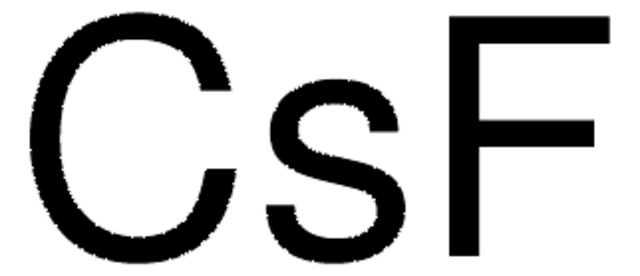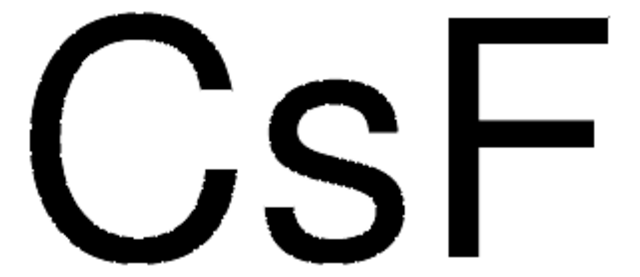20989
Cesium fluoride
BioUltra, ≥99.0% (F)
Synonym(s):
NSC 84270
About This Item
Recommended Products
product line
BioUltra
Quality Level
Assay
≥99.0% (F)
impurities
insoluble matter, passes filter test
≤0.005% total nitrogen (N)
loss
≤0.5% loss on drying, 110 °C
pH
6.5-7.5 (25 °C, 3 M in H2O)
mp
682 °C (lit.)
solubility
H2O: 3 M at 20 °C, clear, colorless
density
4.115 g/mL at 25 °C (lit.)
anion traces
chloride (Cl-): ≤500 mg/kg
sulfate (SO42-): ≤50 mg/kg
cation traces
Al: ≤10 mg/kg
As: ≤0.5 mg/kg
Ba: ≤10 mg/kg
Bi: ≤5 mg/kg
Ca: ≤10 mg/kg
Cd: ≤5 mg/kg
Co: ≤5 mg/kg
Cr: ≤5 mg/kg
Cu: ≤5 mg/kg
Fe: ≤30 mg/kg
K: ≤100 mg/kg
Li: ≤5 mg/kg
Mg: ≤5 mg/kg
Mn: ≤5 mg/kg
Mo: ≤5 mg/kg
Na: ≤50 mg/kg
Ni: ≤5 mg/kg
Pb: ≤5 mg/kg
Sr: ≤5 mg/kg
Zn: ≤5 mg/kg
λ
3 M in H2O
UV absorption
λ: 260 nm Amax: 0.05
λ: 280 nm Amax: 0.05
SMILES string
[F-].[Cs+]
InChI
1S/Cs.FH/h;1H/q+1;/p-1
InChI key
XJHCXCQVJFPJIK-UHFFFAOYSA-M
Looking for similar products? Visit Product Comparison Guide
Application
- Preparation of building blocks for synthesis of fluoroallylic compounds
- Synthesis of alcohols via hydrolysis of alkyl silyl ethers at neutral pH in buffered mixed organic-aqueous solutions
- Nucleophilic fluorination of alkynyliodonium salts to form fluorovinylic compounds
- Nucleophilic aromatic substitution (SNAr) reactions
Not finding the right product?
Try our Product Selector Tool.
Signal Word
Danger
Hazard Statements
Precautionary Statements
Hazard Classifications
Acute Tox. 4 Oral - Aquatic Chronic 3 - Eye Dam. 1 - Repr. 2 - STOT RE 2
Target Organs
Kidney,Adrenal gland
Supplementary Hazards
Storage Class Code
11 - Combustible Solids
WGK
WGK 2
Flash Point(F)
Not applicable
Flash Point(C)
Not applicable
Personal Protective Equipment
Certificates of Analysis (COA)
Search for Certificates of Analysis (COA) by entering the products Lot/Batch Number. Lot and Batch Numbers can be found on a product’s label following the words ‘Lot’ or ‘Batch’.
Already Own This Product?
Find documentation for the products that you have recently purchased in the Document Library.
Customers Also Viewed
Our team of scientists has experience in all areas of research including Life Science, Material Science, Chemical Synthesis, Chromatography, Analytical and many others.
Contact Technical Service








